Unusual Circumstances
On March 8, 1935, the day Hachi died, a team of veterinarians from the College of Agriculture at the Imperial University of Tokyo conducted his necropsy. Back then, performing a necropsy on a dog was quite unusual, but Hachi was no ordinary dog.
Controversial Claims
There was a controversy surrounding the cause of Hachi’s death. Some heartless individuals who believed Hachi went to Shibuya Station for a handout of yakitori claimed that he died from eating it. They assumed that the bamboo sticks found in his stomach were yakitori skewers. However, it was possible that the bamboo sticks were from other food, like oden (stewed fishcakes) or sweet rice cakes. Nonetheless, they insisted that the yakitori skewers had choked or damaged his stomach, leading to his demise.
The Unveiling of Truth
In contrast, the necropsy revealed that Hachi had succumbed to dirofilariasis (heartworms), which had severely affected his heart and lungs. The examination also identified complications such as ascites and liver fibrosis, associated with dirofilariasis.
During the necropsy, the team of veterinarians discovered four bamboo sticks in Hachi’s stomach. These sticks could have been yakitori skewers or any other type of food. However, they did not cause any harm to his internal organs, ultimately ruling out their involvement in Hachi’s death. Therefore, the necropsy definitively determined that Hachi’s passing resulted from a combination of dirofilariasis and old age.
Silent Witnesses

To this day, Hachi’s preserved internal organs, including his heart and lungs, liver and spleen, and esophagus, are exhibited in three specimen bottles at the Museum of the Faculty of Agriculture, located at the University of Tokyo Yayoi campus.
If you wish to delve further into the captivating life of Hachiko, we invite you to explore the pages of the new Hachiko biography, available here.
And stay tuned to our blog for regular Hachiko Snapshots, where you can follow his incredible journey from a sickly puppy to a worldwide icon. Join us on the 14th of each month, his birthday, right here on the blog.
Author Mayumi Itoh is considered the “official biographer” of Hachiko. Mayumi is a former Professor of Political Science at the University of Nevada, Las Vegas, and has previously taught at Princeton University and Queens College, City University of New York. She currently teaches haiku writing at Princeton University.



 >
>
